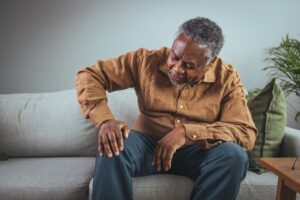
Want proof? Just look at the results from a recent University of Michigan survey.
Findings from the University of Michigan National Poll on Healthy Aging include that 70 percent of people over 50 experience joint pain at least occasionally, and 60 percent have been told they have some form of arthritis.
Among those with arthritis symptoms, about 45 percent said they have pain every day, and 49 percent said it somewhat limits their activities.
The survey also broke down how pain sufferers treat it:
- 80 percent said they had at least some confidence they could treat it on their own
- About 66 percent use OTC meds like Tylenol, Advil, Motrin, etc.
- 26 percent take supplements
- 11 percent use cannabidiol (CBD)
- 9 percent use marijuana
- 18 percent use non-opioid prescription-only pain meds
- 19 percent get steroidal injections
- 14 percent treat the pain with prescription opioids
Interestingly, most people (60 percent) who take two or more of these treatments have not talked with their doctor about the potential risks.
Taking multiple medications to treat pain associated with rheumatoid arthritis, for example, for extended periods, may impact stomach and liver health, blood pressure, blood sugar, mood, and sleep.
Treating pain from osteoarthritis, which is caused by use and wear and tear, can usually be effectively treated or managed with natural measures. Weight loss, exercise, tai-chi, yoga, acupuncture, as well as tools like a brace, splints, or hot or cold compresses, can all help.
They also found that joint pain was closely linked with overall health. Those that reported having poor or fair physical health were more than twice as likely to say that they had moderate or severe joint pain as those in better health. These results were similar for people who reported fair or poor mental health compared to those who reported better mental health.
If you’re experiencing joint pain, it is important to contact your doctor to discuss treatment protocols, options, and risks. You don’t have to go at it alone.